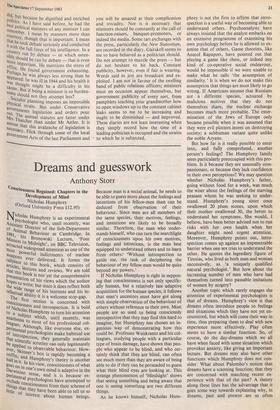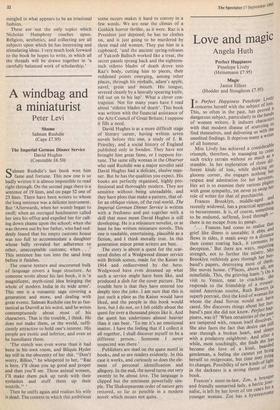Dreams and guesswork
Anthony Storr
Consciousness Regained; Chapters in the Development of Mind Nicholas Humphrey (Oxford University Press £12.95) icholas Humphrey is an experimental
PsYchologist who, until recently, was Assistant Director of the Sub-Department of Animal Behaviour at Cambridge. In 1981, his Bronowski Lecture, 'Four Minutes to Midnight', on BBC Television, attracted widespread attention as one of the most powerful indictments of nuclear Weapons ever delivered. It forms the tailpiece to this book, which consists of articles, lectures and reviews. We are told that this book is not yet the comprehensive Presentation of his views which the author hopes to write; but since it does reflect in- tellectual the Wide range of his interests and his ability it is a welcome stop-gap. The first section is concerned with consciousness and introspection. It is bold Of Nicholas Humphrey to turn hi S attention to a subject which, until recently, was anathema to most of his professional col- leaps Although, like everyone else, ex- perimental psychologists make habitual use of introspection, they generally maintain that scientific scrutiny can only legitimately be applied to observable behaviour. How- ever, Skinner's box is rapidly becoming a c°frri, and Humphrey's theory is another nail in it. In his view, consciousness of what pi es on in one's own mind is adaptive n the "arwinian sense, and it is because ex- Perimental psychologists have attempted to exclude lude consciousness from their scheme of things that they have been able to tell us so little
of interest about human beings. Because man is a social animal, he needs to be able to guess more about the feelings and intentions of his fellow-men than can be deduced from observation of their behaviour. Since men are all members of the same species, their motives, feelings, and intentions are likely to be broadly similar. Therefore, the man who under- stands himself, who can turn the searchlight of consciousness upon his own motives, feelings and intentions, is the man best equipped to understand others and to learn from others; `Without introspection to guide me, the task of deciphering the behaviour of my fellow men would be quite beyond my powers.'
If Nicholas Humphrey is right in suppos- ing that consciousness is not only specific- ally human, but a relatively late adaptive acquisition for the human species, it follows that man's ancestors must have got along with simple observation of the behaviour of others without reference to their own. Most people are so used to being consciously introspective that they may find this hard to imagine, but Humphrey has chosen an in- genious way of demonstrating how this could be. Professor Weiskrantz and his col- leagues, studying people with a particular type of brain damage, have shown that peo- ple who appear to be blind, and who cer- tainly think that they are blind, can often see much more than they are aware of being able to do if they can be persuaded to guess what their blind eyes are looking at. This strange phenomenon of tlindsight' shows that seeing something and being aware that one is seeing something are two different things.
As he knows himself, Nicholas Hum-
phrey is not the first to affirm that intro- spection is a useful way of becoming able to understand others. Psychoanalysts have always insisted that the analyst embarks on an extensive programme of examining his own psychology before he is allowed to ex- amine that of others. Game theorists, like Anatol Rapaport, have pointed out that playing a game like chess, or indeed any kind of co-operative social endeavour, would be impossible if we were unable to make what he calls 'the assumption of similarity.' It is when we do not make this assumption that things are most likely to go wrong. If Americans assume that Russians are a different species, actuated by malicious motives that they do not themselves share, the nuclear exchange becomes much more probable. The exter- mination of the Jews of Europe only became possible when it was assumed that they were evil plotters intent on destroying society; a subhuman variant quite unlike the noble Aryans.
But how far is it really possible to enter Into, and fully comprehend, another person's feelings? The Humphrey family seem particularly preoccupied with this pro- blem. Is it because they are unusually com- passionate, or because they lack confidence in their own perceptions? We may question whether Nicholas Humphrey's father, going without food for a week, was much the wiser about the feelings of the starving peasant whom he was seeking to under- stand. Humphrey's young sister once swallowed 20 plum stones, upon which their mother swallowed 30, the better to understand her symptoms. She would, I believe, have been better advised not to run risks with her own health when her daughter might need urgent attention. Moreover, Humphrey points out, intro- spection comes up against an impenetrable barrier when one sex tries to understand the other. He quotes the legendary figure of Tiresias, who lived as both man and woman successively, as 'a uniquely qualified natural psychologist.' But how about the increasing number of men who have had themselves turned into passable imitations of women by surgery?
Another topic which rarely engages the attention of experimental psychologists is that of dreams. Humphrey's view is that dreams often introduce people to feelings and situations which they have not yet en- countered, but which will come their way in time, thus preparing them to deal with new experience more effectively. Play often seems to have a similar function. So, of course, do the day-dreams which we all have when faced with some situation which provokes anxiety, like giving an important lecture. But dreams may also have other functions which Humphrey does not con- sider. What about Palombo's notion that dreams have a scanning function; that they are concerned with matching recent ex- perience with that of the past? A theory along these lines has the advantage that it goes some way towards explaining why, in dreams, past and present are so often mingled in what appears to be an irrational fashion.
These are not the only topics which Nicholas Humphrey touches upon. Religion, aesthetics, and collecting are all subjects upon which he has interesting and stimulating ideas. I very much look forward to the book he hopes to write, in which all the threads will be drawn together in 'a carefully balanced work of scholarship.'







































 Previous page
Previous page